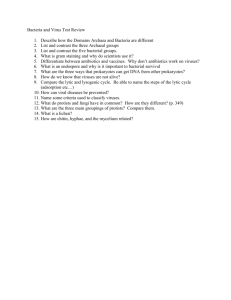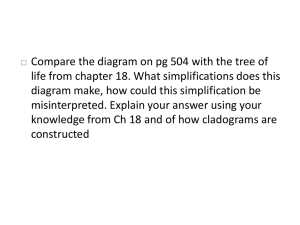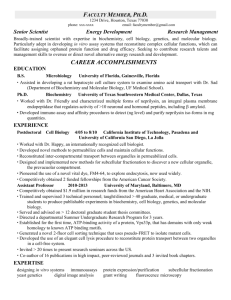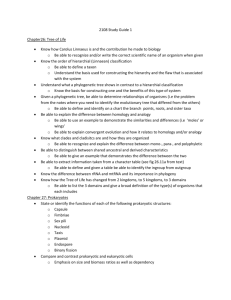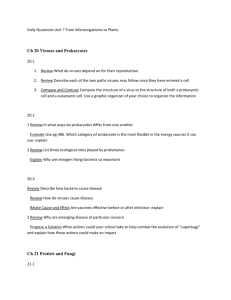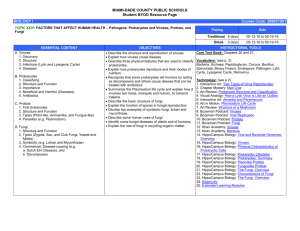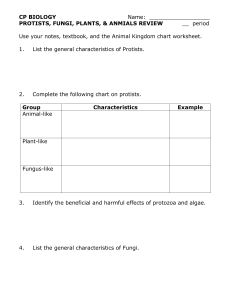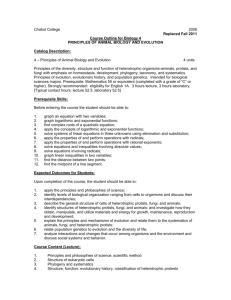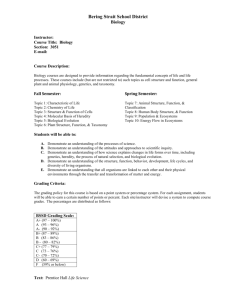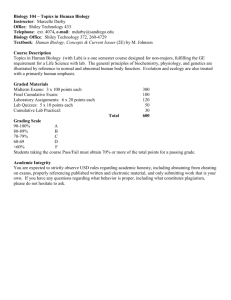Course Syllabus - Bevill State Community College
advertisement
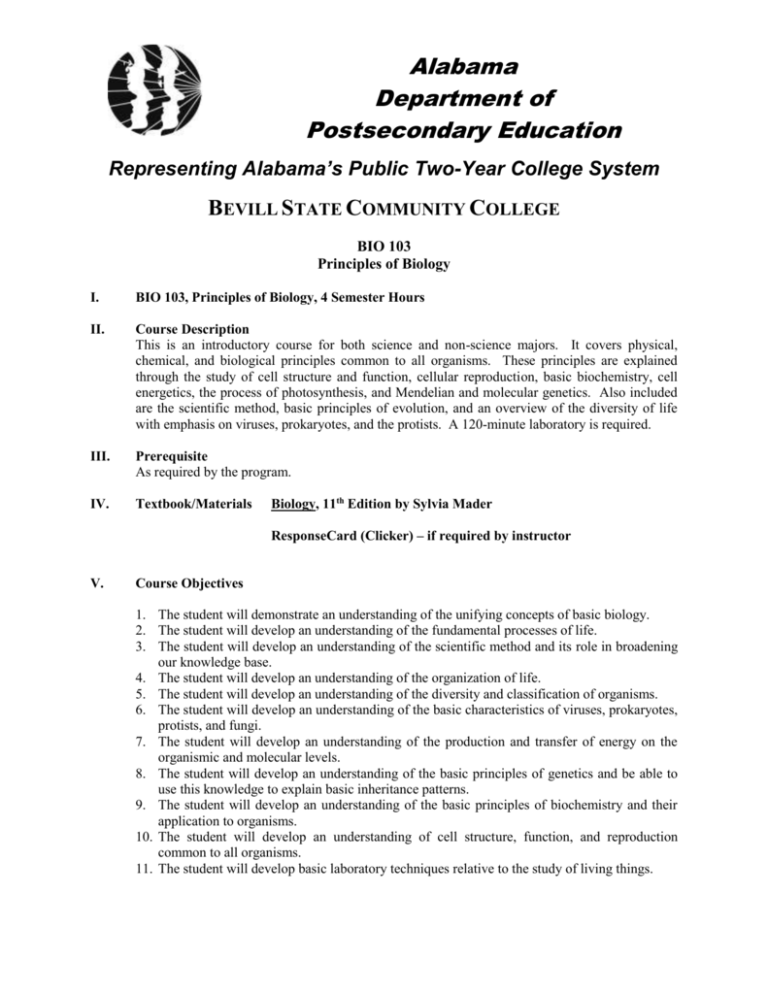
Alabama Department of Postsecondary Education Representing Alabama’s Public Two-Year College System BEVILL STATE COMMUNITY COLLEGE BIO 103 Principles of Biology I. BIO 103, Principles of Biology, 4 Semester Hours II. Course Description This is an introductory course for both science and non-science majors. It covers physical, chemical, and biological principles common to all organisms. These principles are explained through the study of cell structure and function, cellular reproduction, basic biochemistry, cell energetics, the process of photosynthesis, and Mendelian and molecular genetics. Also included are the scientific method, basic principles of evolution, and an overview of the diversity of life with emphasis on viruses, prokaryotes, and the protists. A 120-minute laboratory is required. III. Prerequisite As required by the program. IV. Textbook/Materials Biology, 11th Edition by Sylvia Mader ResponseCard (Clicker) – if required by instructor V. Course Objectives 1. The student will demonstrate an understanding of the unifying concepts of basic biology. 2. The student will develop an understanding of the fundamental processes of life. 3. The student will develop an understanding of the scientific method and its role in broadening our knowledge base. 4. The student will develop an understanding of the organization of life. 5. The student will develop an understanding of the diversity and classification of organisms. 6. The student will develop an understanding of the basic characteristics of viruses, prokaryotes, protists, and fungi. 7. The student will develop an understanding of the production and transfer of energy on the organismic and molecular levels. 8. The student will develop an understanding of the basic principles of genetics and be able to use this knowledge to explain basic inheritance patterns. 9. The student will develop an understanding of the basic principles of biochemistry and their application to organisms. 10. The student will develop an understanding of cell structure, function, and reproduction common to all organisms. 11. The student will develop basic laboratory techniques relative to the study of living things. VI. Course Outline of Topics Lecture Outline Topics A. B. C. D. E. F. G. H. Introduction to Biology – This includes a historical perspective, scientific method, characteristics of life, species diversity and evolution, levels of organization, and classification. A survey of viruses, prokaryotes, protists, and fungi. Chemical Basis of Life – This includes atomic structure, chemical bonding, the importance of water in biological systems, ionization, and inorganic and organic compounds including a study of carbohydrates, lipids, proteins, and nucleic acids. Cell Structure and Function – This includes the cell theory, a study of eukaryotic and prokaryotic cells, cell structures and their functions, and biological membranes and cellular transport. Cell Energetics – This includes a study of thermodynamics, energy transformations and metabolism, a study of ATP, cellular respiration, and photosynthesis. Cell Reproduction – This includes a study of chromosomes, mitosis, and meiosis. Cell Genetics – This includes a study of Mendel’s experiments and laws, genetic crosses, basic genetic phenomena, and molecular genetics. Nucleic Acids – This includes a study of DNA structure and replication and RNA structure and protein synthesis. Laboratory Outline Topics Prepared slides, preserved specimens, living materials, and experimentations are used to cover the following topics: A. B. C. D. E. F. G. H. I. J. K. L. M. N. VII. Introduction to lab Overview of the diversity of life Natural Selection and Taxonomy Viruses, prokaryotes, protists, and fungi Introduction to the microscope Introduction to biochemistry Introduction to the cell Diffusion, osmosis, and membranes Enzymes Cell Respiration Photosynthesis Mitosis Meiosis Genetics Evaluation and Assessment Lecture exams Lab reports Observed/graded performance of lab techniques Lab exams Other activities BIO103 Page 2 2014-2015 Academic Year (Updated 8.05.2014) The laboratory experience should represent approximately 25 percent of the final grade for this course. Grades will be given based upon A = 90 – 100%, B = 80 – 89%, C = 70 – 79%, D = 60 – 69%, and F = below 60%. VIII. Attendance Class attendance is considered an essential part of the educational process at Bevill State Community College. The College subscribes to the philosophy that a student’s academic success is directly proportional to class attendance. It is the responsibility of the student to attend all classes and perform assignments as prescribed by instructors and appropriate syllabi. Attendance requirements in Health Science and Career Technical programs may differ from the policy above. IX. Electronic Devices Policy College instructors and staff may limit student use of electronic devices such as cell phones, pagers, cameras, laptop computers, IPads, and IPods where such devices might interfere with the normal activity of the College. Students may use electronic devices to record class lectures. X. Statement on Discrimination/Harassment The College and the Alabama State Board of Education are committed to providing both employment and educational environments free of harassment or discrimination related to an individual’s race, color, gender, religion, national origin, age, or disability. Such harassment is a violation of State Board of Education policy. Any practice or behavior that constitutes harassment or discrimination will not be tolerated. XI. Americans with Disabilities The Rehabilitation Act of 1973 (Section 504) and the Americans with Disabilities Act of 1990 state that qualified students with disabilities who meet the essential functions and academic requirements are entitled to reasonable accommodations. It is the student’s responsibility to provide appropriate disability documentation to the College. XII. Classroom Safety and Security All students are expected to be familiar with emergency evacuation procedures, emergency medical procedures, and potential classroom hazards. The instructor should review these procedures at the beginning of the semester, either orally or in writing. Please ask for clarification if your instructor fails to adequately review these procedures. BIO103 Page 3 2014-2015 Academic Year (Updated 8.05.2014)
